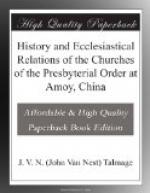But to return to the subject of the mistaken impressions concerning the views of your Missionaries at Amoy. These impressions would have been partly corrected in the Church, if the report of the proceedings of Synod, in “The Christian Intelligencer,” had been more correct on this subject. That paper states, that, on Friday evening, “Rev. Mr. Talmage then took the floor, and addressed the Synod for nearly two hours,” but does not give a single word or idea uttered by him. It is careful to report the only unkind words against the Missionaries uttered during that whole discussion, which, with this single exception, was conducted in a spirit of the utmost Christian kindness; but does not give a word of the remarks made on the Friday evening previous, on that very subject, in justification of their course.
It seems to be a duty, though painful, to speak particularly on this subject. Look at the following language: “I know that we are told that the hybrid organization [i.e. the Classis, a court of the Church of Christ, at Amoy] which now exists is every way sufficient and satisfactory; that it is the fruit of Christian love, and that to disturb it would be rending the body of Christ. Here one might ask, how it came to exist at all, seeing that this Synod spoke so plainly, and unambiguously, in 1857; and I, for one, cordially concur in the remark of the elder, Schieffelin, that the brethren there ’deserve censure.’ We do not censure them, nor do we propose to do so; but that they deserve it is undeniable. But the point is, how can our disapproval of the mongrel Classis mar the peace of the Amoy brethren?” This language was used by the President of Synod, after asking whether the Synod was ready for the question, “the question being about to be put,” when an attempt to answer it seemed altogether out of place. In all the circumstances it seemed almost like the charge of a judge to a jury. I do not say that there is any improper spirit manifested, or opprobrious expressions employed in this language, or that the President did wrong in waiting until the discussion was over before he uttered it, or that the missionaries are not deserving of such severe censure—of all these things let the Church judge—but I do say that the spreading of such language and such charges broadcast, before the Church and before the world, demands that the missionaries be heard in self-defense, or, which is all they ask, that they be allowed to state the facts and views which guided them in their action.
Doubtless it was an oversight that such a one-sided report on this subject appeared in The Christian Intelligencer. At least it was not at all designed that injustice be done to the Missionaries, but, unless they be allowed to speak for themselves, is not injustice done them? It seemed to me that a very mistaken impression concerning the views expressed by me, near the close of the session of Synod, was also conveyed by the Report. This




